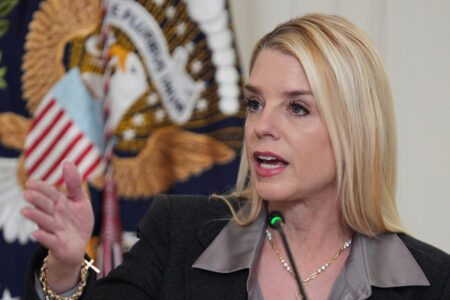Anxiety continues to build over possible healthcare cuts

U.S. Sen. Maggie Hassan recently met with healthcare providers in Nashua to discuss the ramifications of federal cuts to healthcare funding. Courtesy photo
NASHUA – The recent passage of the Republican-led Big Beautiful Bill by the U.S. House of Representatives has intensified concerns among local healthcare providers as to what the legislation could mean for their patients should it be signed into law.
During her May 27 meeting with local healthcare workers, U.S. Sen. Maggie Hassan (D-NH) said the bill’s tax breaks would be paid for with massive reductions to healthcare funding and increasing the national debt by $36 trillion over the next 30 years.
“Literally, the wealthiest people in the country would get tax breaks,” she said, adding that 36,000 Granite Staters could lose their health insurance. “I can’t think of a worse idea.”
Hassan also said GOP lawmakers did not reach across the aisle for input on crafting the bill.
In addition, Hassan said Christi Grimm, former inspector general of the U.S. Department of Health and Human Services, was one of eight inspectors general to be terminated by President Donald Trump on Jan. 24. Hassan also said Grimm’s firing came despite her success in recovering $400 million in healthcare fraud last year.
During the meeting at Lamprey Health Care, parent Kadesha Palmer said her six-year-old son Cameron is living with autism and therefore requires a number of specialized services that have been covered by Medicaid.
“Medicaid is not just insurance,” she said. “Without those services, my son would fall behind in ways that are unimaginable.”
Sandra Pelletier, president and CEO of Gateways Community Services, said her organization provides lifelong care to 2,800 patients — 90 percent of whom are on Medicaid.
She said a large number of patients lost coverage during the Medicaid Unwind which was triggered when the COVID-19 public health emergency ended in May 2023. Since then, they have been struggling to have their policies reinstated.
“Medicaid is not easy to get,” said Pelletier. “You have to jump through 100 hoops.”
Tracy Tinker, a certified diabetes care and education specialist at Lamprey, described diabetes as an “expensive disease.” She said that without insurance, patients would begin rationing their medications and cancelling doctor’s appointments.
“It doesn’t need to happen,” said Tinker.
Marissa Berg, executive director of the Community Support Network, said she has approximately 5,000 patients under her care.
“They don’t stop needing support,” she said. “These people aren’t going to go away.”
Astrid Henry, a licensed clinical mental health counselor at Lamprey, said 90 percent of her patients have a history of trauma.
However, without Medicaid coverage, the services offered by Henry and her colleagues would be pushed to the wayside.
“The first thing they would drop is therapy,” she said.
Susan Durkin, co-CEO at Lamprey, said more than half of her patients are at or below the poverty line.
“Our ability to care for them is really going to deteriorate,” she said. “We’re clearly very concerned.”



